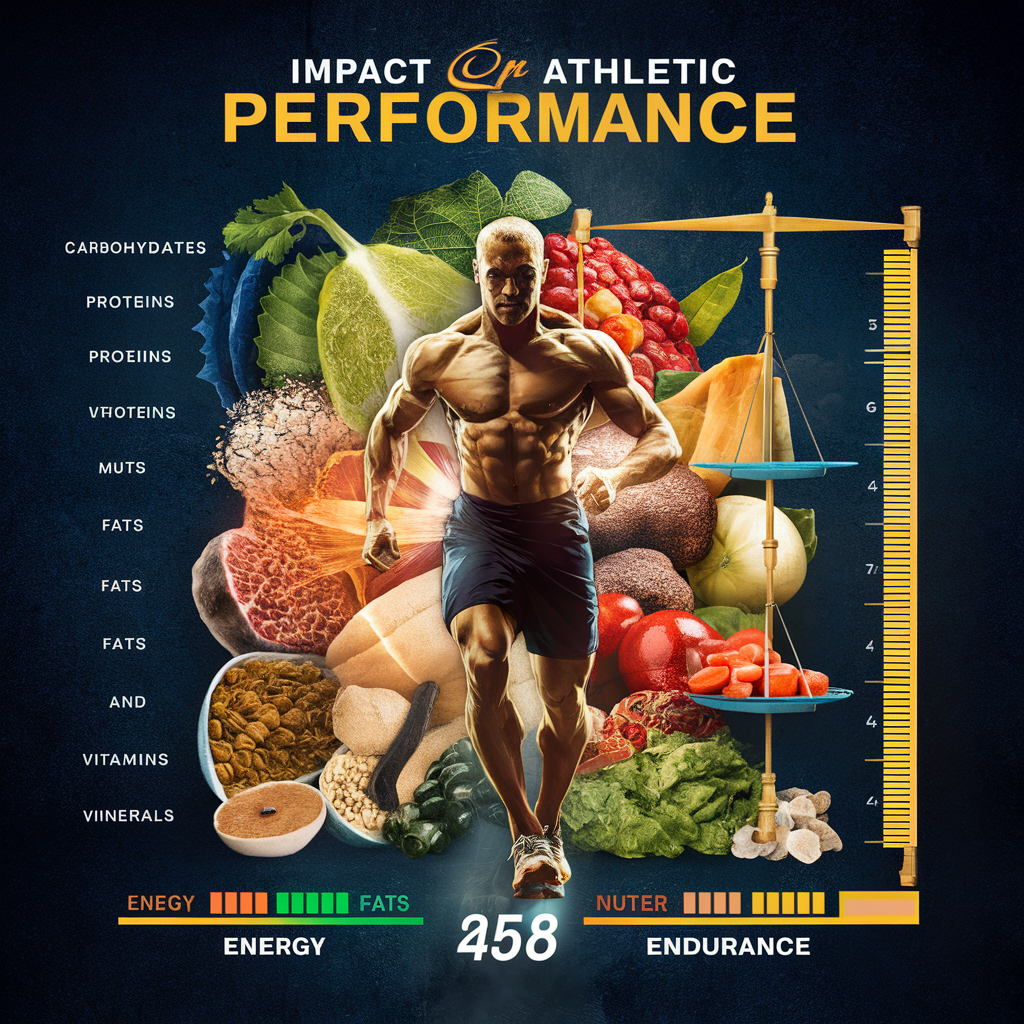The Impact of Nutrition on Athletic Performance
It’s often said that you are what you eat. For athletes, this adage rings particularly true. Nutrition plays a pivotal role in optimizing performance, recovery, and overall health. Whether you’re a weekend warrior or a professional athlete, the food choices you make can significantly influence your physical capabilities. So, let’s dive into the fascinating world of sports nutrition and discover how what you consume can either propel you to greatness or leave you gasping for breath on the sidelines.
The Basics: Macronutrients and Micronutrients
Before we get into the nitty-gritty, let’s break down the fundamental building blocks of nutrition: macronutrients and micronutrients. Think of macronutrients as the heavyweight champions of nutrition—carbohydrates, proteins, and fats—while micronutrients are the unsung heroes, including vitamins and minerals that your body needs in smaller amounts.
Carbohydrates: The Fuel of Champions
Carbohydrates are the body’s primary source of energy, especially during high-intensity exercise. When you think of carbs, you might picture a plate of pasta or a slice of bread. But not all carbs are created equal. Simple carbohydrates—like those found in sugary snacks—can provide a quick burst of energy, but they often lead to a crash soon after. Complex carbohydrates, on the other hand, found in whole grains, fruits, and vegetables, offer sustained energy.
In fact, many elite athletes adhere to a carbohydrate-loading regimen before major competitions. This technique involves increasing carbohydrate intake to maximize glycogen stores in the muscles. It’s a bit like filling up your car’s gas tank before a long road trip—only, instead of a fuel gauge, you’re monitoring your performance on the field.
Proteins: The Building Blocks
Protein is vital for muscle repair and growth. Athletes often increase their protein intake to support recovery after intense training sessions. Common sources include lean meats, dairy, legumes, and nuts. It struck me during a conversation with a strength coach that many athletes overlook the timing of protein consumption. Consuming protein shortly after a workout can be more beneficial than waiting until dinner. (You won’t find a bodybuilder sipping on kale smoothies and calling it a day!)
Fats: The Essential Nutrient
While some might still see fats as the enemy, they are essential for hormone production, vitamin absorption, and overall cellular health. Healthy fats, such as those found in avocados, olive oil, and fatty fish, should be included in an athlete’s diet. Think of fats as the long-lasting battery of your body, providing energy for extended periods of low to moderate activity.
The Role of Hydration
Ah, hydration—the often-overlooked aspect of nutrition. Did you know that even mild dehydration can impair physical performance? I remember watching a marathon where a runner collapsed just a few meters from the finish line, a painful reminder that water is just as crucial as any energy gel. Staying hydrated helps regulate body temperature, lubricates joints, and transports nutrients.
When it comes to fluid intake, the general rule is to drink water regularly throughout the day, and to replenish lost fluids during and after exercise. Some athletes swear by electrolyte drinks, especially during long training sessions. But, be cautious—while staying hydrated is vital, chugging down sugary sports drinks can lead to unwanted weight gain and a sugar crash.
Nutritional Timing: When to Eat
Timing your meals around workouts can also enhance performance and recovery. Consuming a balanced meal or snack with carbs and protein before exercise can provide the necessary energy and help prevent muscle breakdown. On the flip side, post-workout nutrition is equally critical. I often hear athletes talk about the “anabolic window,” which suggests that the first 30 minutes after exercise is the prime time to refuel. While research varies on the exact timing, it’s generally accepted that replenishing nutrients soon after a workout can speed up recovery.
Pre-Workout Nutrition
What you eat before a workout can determine how well you perform. A meal rich in complex carbohydrates combined with some protein—think oatmeal with fruit and a dollop of yogurt—can provide the energy needed to power through that grueling training session. It’s best to consume this meal about 2-3 hours before hitting the gym or track.
Post-Workout Nutrition
After a workout, your body craves nutrients to repair and replenish. A combination of protein and carbohydrates is ideal. For example, a protein shake with a banana or grilled chicken with sweet potatoes can do the trick. (I’ve been known to indulge in a post-workout chocolate milk once in a while—don’t judge!)
The Impact of Supplements
In today’s world, supplements are as ubiquitous as smartphones. But do they really make a difference? While a balanced diet can provide most of the nutrients an athlete needs, some may benefit from supplements—especially if they have specific dietary restrictions or needs. For instance, vegan athletes might require vitamin B12 and iron supplements to meet their needs.
Protein powders, creatine, and branched-chain amino acids (BCAAs) are popular among athletes looking to enhance performance. However, it’s essential to approach supplementation with caution. Some products can be contaminated with banned substances, and not all supplements are created equal. Consulting with a nutritionist or medical professional before diving headfirst into the supplement world is wise.
Nutrition for Recovery
Let’s not forget that recovery is just as important as training. Nutrition plays a crucial role in this process. Consuming anti-inflammatory foods—like berries, leafy greens, and fatty fish—can help reduce soreness and aid recovery. I once tried incorporating more turmeric and ginger into my meals after hearing about their anti-inflammatory properties. Spoiler alert: my meals turned a lovely shade of yellow, but I felt better!
Additionally, getting enough sleep and managing stress levels are essential components of recovery, but that’s a whole different article. (Maybe I’ll call it “The Sleepy Athlete: Why Counting Sheep Could Be Your Best Strategy!”)
The Psychological Aspects of Nutrition
Nutrition isn’t just about the physical; it has psychological implications too. Athletes often find their performance tied to their diet. The right nutrition can enhance confidence, improve mood, and even reduce anxiety before competition. I remember speaking with a gymnast who shared how her pre-competition meal ritual helped calm her nerves. It’s fascinating how the mind and body are intertwined in the realm of sports.
Food Choices and Mental Clarity
Some studies suggest that consuming a diet rich in omega-3 fatty acids can improve cognitive function, which could be beneficial for athletes who need to stay sharp during competition. Foods such as fatty fish, walnuts, and flaxseeds can be great additions to the diet for anyone looking to boost both physical and mental performance.
Common Myths Debunked
There are a plethora of myths surrounding athletic nutrition, and it’s time to set the record straight. One common misconception is that athletes need to eat an exorbitant amount of protein—more than the average person—to build muscle. While protein is essential, excessive consumption doesn’t equate to greater muscle gains. The body’s ability to utilize protein is limited, and too much can lead to unwanted weight gain.
Another myth is that carbohydrates should be avoided to maintain a lean physique. However, as discussed earlier, carbs are crucial for energy. Cutting them out entirely is like throwing out the engine from a car and expecting it to run smoothly. You might get a few miles in, but eventually, you’ll come to a halt!
Cultural Influences on Nutrition
Nutrition doesn’t exist in a vacuum; it’s influenced by cultural practices, regional diets, and personal preferences. In many cultures, food is a way to celebrate achievements, and athletes often find themselves navigating these social landscapes while trying to maintain their dietary goals. I recall an athlete friend who had to politely decline a delicious-looking piece of cake at a celebration. It’s not just about discipline; it’s about finding balance in a world that often revolves around food.
Practical Tips for Athletes
So, what can athletes take away from all this? Here are some practical tips:
- Plan Ahead: Meal prep can save time and ensure you have healthy options readily available.
- Listen to Your Body: Everyone’s nutritional needs differ. Pay attention to how certain foods make you feel.
- Stay Informed: Nutrition science is constantly evolving. Stay updated with credible sources and research.
- Enjoy Your Food: Eating should be a pleasurable experience. Find healthy meals that you love!
The Road Ahead: Future Trends in Sports Nutrition
The field of sports nutrition is ever-evolving, with new research continuously shaping our understanding. We’re starting to see a shift towards personalized nutrition, where athletes receive tailored dietary advice based on their genetics, metabolism, and specific needs. It’s reminiscent of a custom-tailored suit—why wear something off the rack when you can have it fit like a glove?
Moreover, the rise of plant-based diets among athletes is also noteworthy. As more athletes adopt vegan or vegetarian lifestyles, research is emerging to support the effectiveness of these diets in promoting performance. It’s a brave new world, my friends, and I can’t wait to see how it unfolds!
Conclusion: Nutrition as a Cornerstone of Athletic Success
As we wrap up our journey through the world of sports nutrition, it’s clear that food is more than just sustenance; it’s a key player in athletic performance. Whether you’re sprinting down the track, lifting weights, or swimming laps, the choices you make at the dinner table can have profound implications for your health and success. So, the next time you sit down to eat, remember: you’re not just fueling your body; you’re investing in your athletic future.
As I often remind aspiring athletes, “You can’t out-train a bad diet.” So, make those choices count, and may your plate be as vibrant as your aspirations.









